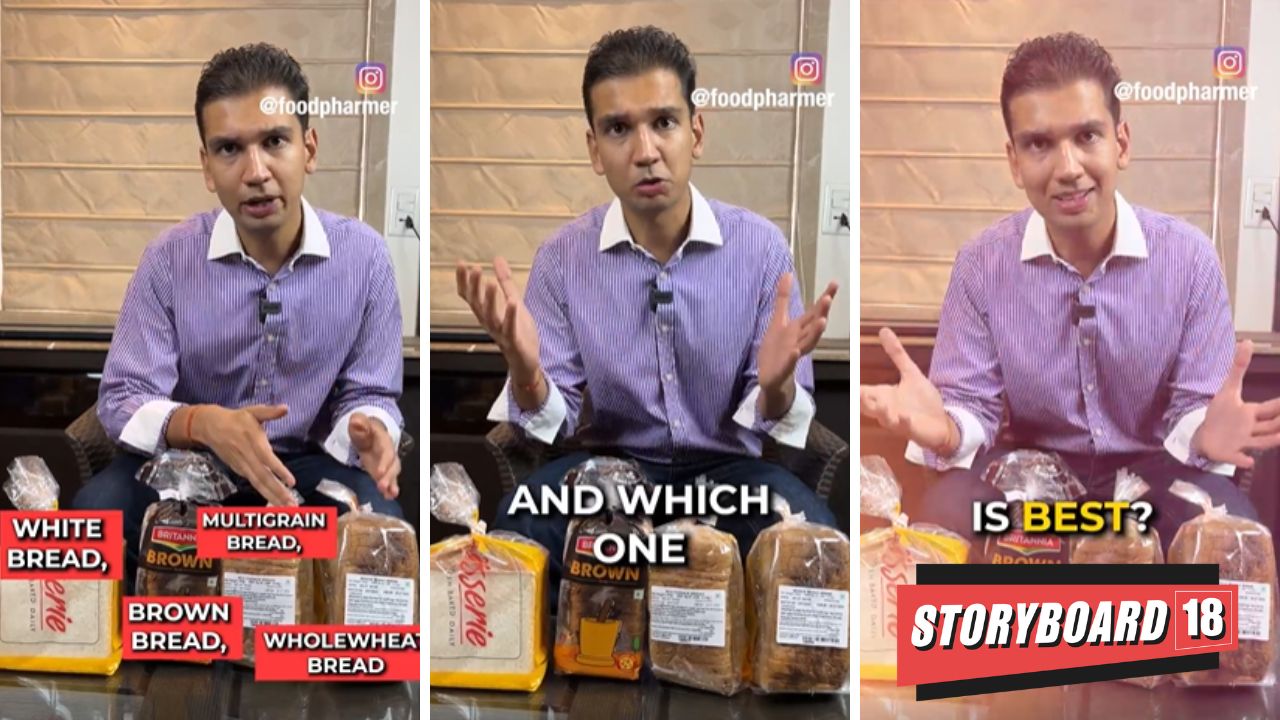Revant Himatsingka, a health and nutrition influencer known publicly as Foodpharmer, gained fame after a viral video highlighting the high sugar content of Bournvita. Now, he is calling out a wide variety of breads being sold by different brands.
Himatsingka took to LinkedIn to talk about how almost all bread brands end up using refined flour (maida) as their first ingredient despite marketing their breads as “whole wheat” or “multigrain.” In the video, one can clearly see the Britannia brand of bread featured along with other brands.
“Bread is a big scam. White bread, brown bread, multigrain bread, and whole wheat bread, what’s the difference and which one is the best? Here are the four facts that every Indian should know about bread,” he says in a minute-long video.
Himatsingka goes on to explain that white bread is filled with maida, which lacks the fiber since the germ and bran layers of wheat are removed during refinement. He also adds that brown breads in India are also not healthy.
“They’re brown because of a caramel color 150a, this caramel color is very similar to the color used in Coke and Bournvita,” he adds.
The food influencer also points out that the whole wheat bread is also not made of whole wheat. According to the food regulator FSSAI, ingredients are listed in order of weight. Most whole wheat breads have “maida” as the first ingredient and use very little whole wheat.
Most multigrain breads in India are also mainly made of maida. Himatsingka suggests that in an ideal world, one should bake their own bread, but since it is not possible for everyone, he recommends having rotis or opting for relatively cleaner brands such as “Baker’s Dozen.”
“..while this bread is not perfect, it is still way better than popular breads. The foods we eat regularly shape our bodies. Many of us eat two slices of bread every day, which is more than 700 slices in a year. Eating a slightly better version of bread can make a huge difference to your body,” he concludes.
In May, Himatsingka caused a stir with his video on Mondelez India-owned malt drink brand Bournvita, highlighting its high sugar content and misleading positioning as a health drink. The video went viral, and he received a legal notice from the company, leading him to take it down. However, it resonated with millions of netizens who called out the brand.
The issue was also addressed by the National Commission for the Protection of Child Rights (NCPCR), the apex body for the protection of child rights, which asked Mondelez India-owned brand Bournvita to review and withdraw all “misleading” advertisements, packaging, and labels following a recent video claiming that the health drink contains a high percentage of sugar and ingredients that may have a harmful impact on children’s health.
He has also called out Hindustan Unilever (HUL)-owned ketchup brand Kissan Tomato Ketchup and Nestle India-owned Maggi tomato ketchup for their high sugar content. Recently, PepsiCo India-owned energy drink brand Sting has forced him to delete his video on energy drinks.
Himatsingka has become the face of the Deinfluencing trend. It is the latest trend to hit the creator content economy, where content
creators share candid reviews on products that they think consumers should avoid buying. Often, these content creators are suggesting
cheaper or alternative products as well. These videos encourage users to think twice about their purchases and to refrain from impulse buying. The trend is big on TikTok in the US market, and it is gaining pace in India as well.
This trend not only allows creators to be an authentic and relatable version of themselves but also shows that honesty will be a brand’s most valued trait.
Clearly, if done well, digital marketing executives believe that deinfluencing could bring a larger sense of accountability and
transparency not only to brands but also to the burgeoning content creator ecosystem of the country.
Viraj Sheth, co-founder of creator management firm Monk Entertainment, tells Storyboard18 that it is important for influencers to call out sub-standard products with the right set of evidence and enough documents to support their argument.
Unlike the previous generation of consumers who relied heavily on big brand names and their marketing narratives, Shradha Agarwal, CEO and co-founder of Grapes, believes that the younger consumer base is way more demanding.
“They are asking hard questions to the brands. I think if deinfluencing can awaken big brands that hold a majority market share
to become more accountable and transparent about their products and how they are being made, then I’m all for it,” she notes.
Read More: Food influencer Foodpharmer calls out PepsiCo for taking down video on Sting energy drink
